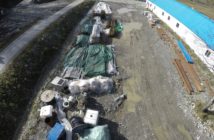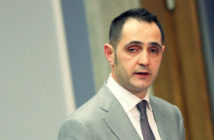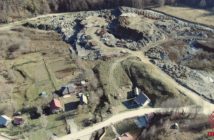Podgorica, 13 November 2010 – Senior State Prosecutor, Ranka Čarapić, carries the bulk of individual responsibility for the fact that the European Commission has once again recognized the sphere of urban development, planning and regulation in Montenegro as among those most susceptible to corruption.
In the Commission’s latest report on Montenegro’s progress towards the EU, it is explicitly stated that the construction industry, building inspectors, spatial planning and zoning agencies, cadastral registry, etc. are all highly prone to corruption. Even though these observations by the Commission have been made for years now , the responsible state institutions – and above all the senior State Prosecutor’s office – have done little to remedy the situation.
It is precisely this lack of concrete results, effective investigations, trials and eventual convictions for corruption and organized crime, that have contributed to urban-development becoming the sphere with the highest perceived levels of corruption. Similar assessments have been made by other international observers, including the US State Department (which similarly notes that the construction industry in Montenegro provides a fertile ground for corruption and money-laundering).
In the past several years, MANS has uncovered many affairs relating to the abuse of administrative positions and corruption in the urban-development sector. It has filed lawsuits against a number of mayors, senior government functionaries and closely-related domestic and foreign construction tycoons. MANS has been trying for years now to get Ranka Čarapić to begin doing her job, including: in the Zavala and Avala affairs in Budva; the sale of land in Karuč; the multimillion dollar affair relating to the selling of land-parcels to the Carine company; as well as numerous other cases involving illegal construction, the violation of tender procedures and abuses of administrative positions.
In spite of this, the investigations in the Zavala case are entering their fourth year with Čarapić’s on-going assurances that the charges “are almost ready” wearing thin. In the meantime, the Russian partner in the deal has almost completed his withdrawal from the country, while the Montenegrin half of this business tandem enjoys immunity as vice-president of the government. Similarly, no one has still had to answer for the illegal reconstruction and expansion of the Avala hotel in Budva (which does not prevent the justice system’s representatives from meeting there).
Nor has anyone answered for the numerous cases of illegal construction at Ada Bojana, Perazić Dol, Miločer Park, Spas hill, Budva’s Tsarist Village, Skočiđevojka, Savina, Prčnjo, Lake Skadar, the National Park Durmitor and a number of other locations. This is largely because the Montenegrin state-prosecutor’s office is hobbled by a cadre like Čarapić who stands at its head. With her inaction, Čarapić has repeatedly proven the lack of political will in the government aimed at confronting corruption and organized crime in the urban-development sector.
The recent building-boom along Montenegro’s coast will be remembered as an era when one could – in a relatively quick and illegal way – earn millions of euros by simply building and selling apartments, without much fear that breaking the law would carry any consequences. It is precisely for this reason that Montenegro has in the past several years become attractive to investors like the Russian Mirax Group, Greece’s Restis, and the local firm Beppler & Jacobson (whose profit-motives were often found to be more important than the law and existing regulations).
The role of the senior State Prosecutor Ranka Čarapić in all of these affairs should have been obvious – to do everything in her power to protect the public interest and state property. Her ability to carry out such a public charge in a responsible manner, however, is best illustrated by her actions in the Zavala case. After three years of apparently gathering evidence, following leads, questioning witnesses and undertaking financial investigations, it is high-time for the public to learn what exactly Čarapić has accomplished and when the first charges will be made public.
MANS once again calls upon the senior State Prosecutor to publicly disclose the real reasons that none of the actors in the Zavala affair have been processed, thereby adding to the perception that the Montenegrin judiciary is seriously incompetent, ineffective, politicized and corrupt.
Dejan Milovac
Director, Urbanism Program



